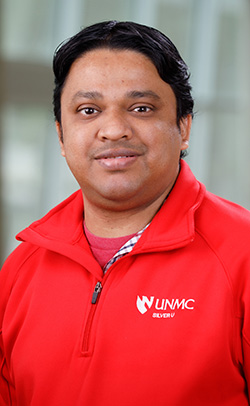A UNMC team, in collaboration with colleagues at the University of Missouri, has identified two potential candidates for an antiviral treatment to fight COVID-19. Their findings were published recently in the Journal of Virology.
 |
| Arpan Acharya, PhD |
In collaboration with Missouri scientists, the UNMC team used a computer program to model millions of compounds for their potential as antiviral treatments for the virus that causes COVID-19. Five emerged as top potential candidates. Out of these five, two compounds were effective in cell culture experiments against both the original SARS-CoV-2 virus and two of its newly emerging variants.
The UNMC-Missouri team will work with private companies to speed the research forward and bring new anti-COVID-19 drugs to the public.
Antivirals, which inhibit virus replication, are needed as a critical weapon in the fight against COVID-19, said Siddappa Byrareddy, PhD, professor and vice chair of research, pharmacology and experimental neuroscience. Vaccines, hampered by hesitancy or availability, have not yet knocked down the pandemic as hoped.
But, "simple antiviral drugs can take care of this," Dr. Byrareddy said. "The problem is, we don’t have potent ones."
So, UNMC partnered with the University of Missouri, and Kamal Singh, PhD. Dr. Singh and his team used computer-aided drug design (CADD) technology to sort, suggest and test millions of antiviral candidates to find ones best suited to inhibit SARS-CoV-2 virus replication and thus stop COVID-19 disease. The UNMC team handled the biology and drug-development aspects of the project.
The CADD modeling identified five potential compounds that could inhibit the hookup of spike protein and receptor. Two, MU-UNMC-1 and MU-UNMC-2, named because they were made in collaborative efforts between the institutions, could prevent the virus from entering host cells during cell culture experiments.
These also blocked two emerging variants, South African and Scotland. Work continues on testing with the currently circulating Delta variant, Dr. Byrareddy said.
Two hours post-infection, the compounds reduced infectivity by up to 80%. They reduced infectivity by 40% when added at the time of infection. But four hours post-infection, there was no effect.
MU-UNMC-2 showed a further synergistic effect when combined with remdesivir.
It also has many other qualities that make it a promising drug candidate.
"MU-UNMC-2 alone or in combination with remdesivir will be a good candidate for development as a prophylactic or therapeutic agent against COVID-19," said UNMC's Arpan Acharya, PhD, the paper's first author.
Dr. Byrareddy said the research must progress from cell-line experiments to small animal models, hoping it remains viable for clinical trials.
As previously noted, a relationship with a private company could aid that progress. "There are not many potent antiviral drugs on the market," Dr. Byrareddy said. "People are interested in these drug candidates."

Nice work Sid, Congratulations!
Congratulation Siddappa Sir!
Congratulations